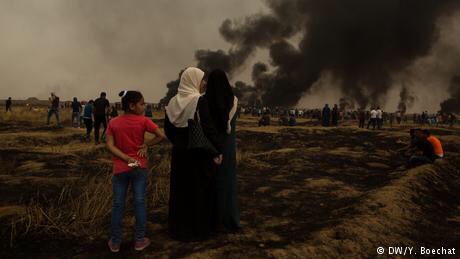
Israeli troops open fire on Gaza protesters
Gaza medics have said four people have been killed and some 600 wounded during rallies along the border fence. The demonstrations coincided with Al-Quds Day, an anti-Israeli day of protests held across the Middle East.
Friday's anti-Israeli Al-Quds Day demonstrations turned violent along the Gaza border, as Israeli soldiers opened fire on Palestinian protesters.
More than 600 Palestinians were reportedly wounded as protesters came under Israeli gunfire as they headed to the Gaza fence. According to Gaza's Health Ministry, at least four Palestinians were killed, including a 15-year-old.
The demonstrations in Gaza were organized by Hamas, the Islamic militant group ruling the blockaded Palestinian enclave. Gaza residents were urged to head to the perimeter fence on the Israeli border after noon prayers. The call was issued through mosques and loudspeakers mounted on cars that toured Gaza neighborhoods.
Several protesting Palestinians also donned uniforms similar to those worn by Jewish prisoners in World War Two. Ahmed Abu Artima told the AP news agency: "We want to remind the world that the Israeli occupation is committing the same massacres that the Nazis committed."
Denying, trivializing or mocking the Holocaust is not uncommon in the Muslim world.

Demonstrators burned US and Israeli flags during Al-Quds Day protests in Tehran
The UN General Assembly on Friday announced it will hold an emergency meeting next Wednesday at 3:00 p.m. (19:00 GMT) to vote on an Arab-backed resolution on Gaza, according to a letter from the body's president Miroslav Lajcak to the 193 member states.
A number of Arab and Muslim countries had called for the session after the United States vetoed a resolution condemning Israel at the UN Security Council last week.
Al-Quds Day protests
The annual Al-Quds Day demonstrations see hundreds of thousands of people across the Middle East protest Israeli control of Jerusalem. Marches were also held in several other Middle East cities, including Damascus, Tehran and Baghdad.
Al-Quds is Arabic for Jerusalem. Protests have been held every year since the 1979 Islamic revolution in Iran. Ayatollah Ruhollah Khomeini declared the last Friday of the fasting month of Ramadan as a day to demonstrate the importance of Jerusalem to Muslims.
This year's protests come at a particularly sensitive time. US President Donald Trump's decision to recognize Jerusalem as the Israeli capital and relocate the US embassy prompted mass unrest across the Muslim world. Jerusalem's Al-Aqsa mosque is the third-holiest site in Islam, after the Saudi cities of Mecca and Medina. Palestinians see the eastern part of the city as the capital of their future state.
Since late March, Palestinians have held regular marches up to the border fence separating Gaza and Israel. At least 115 protesters have been killed by Israeli soldiers during the marches, and a further 3,800 have been wounded. Despite drawing widespread international criticism, Israel has defended its decision to open fire on protesters, saying it has a right to defend its border.
Anti-Israeli protests in major Middle East cities
Al-Quds Day protests began early in Iran with nationwide marches, including a major rally outside of Tehran University. Crowds in the capital burned US and Israeli flags and chanted "Death to America" and "Death to Israel." An effigy of US President Donald Trump was also hanged from a crane.
Iran does not recognize the state of Israel and openly backs anti-Israeli militant groups, including Hamas and Lebanon's Hezbollah.
In Damascus, scores of Syrians and Palestinians marched from the Hamidyeh market in the old city to the Umayyad Mosque, waving Syrian and Palestinian flags. Syrian citizen Samah Abdullah told AP that the Jerusalem issue was a cause affecting all Muslims and that commemorating the day was a "motivation for us and for all Palestinians to restore the occupied land."
In Baghdad, Iran-backed Shiites held up posters of the late Iranian leader Ayatollah Khomeini and Supreme Leader Ayatollah Ali Khamenei before going on to set an Israeli flag on fire.
In the Pakistani capital of Islamabad, Shiite and Sunni Muslims rallied together against Israel, burning Israeli and US flags, as well as a Trump effigy. Pakistan also does not have diplomatic relations with Israel and has observed the Al-Quds Day since it began in 1979.
No comments:
Post a Comment